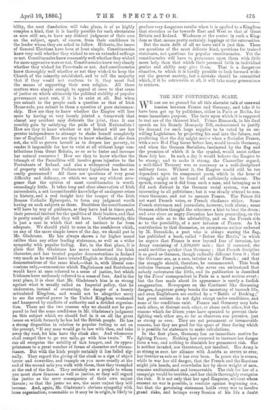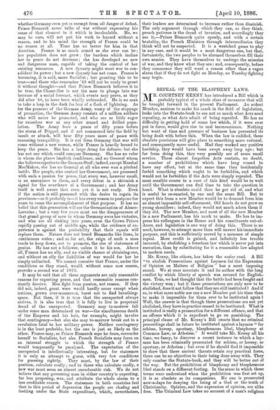THE NEW CONTINENTAL SCARE.
AVE can see no ground for all this alarmist talk of renewed tension between France and Germany, and take it to have been got tip by politicians, either in Paris or Beilin, for some immediate purpose. The facts upon which it is supposed to rest are of the thinnest kind. Prince Bismarck, in his final speech on his Brandy Monopoly Dill, endeavoured to justify his demand for such large supplies to be voted by an un- willing Legislature, by projeeting his soul into the future, and predicting that the day might arrive when a Socialist France, with a new Red Flag borne before her, would invade Germany, and when the German Socialists, fascinated by the flag and the promises of which it is the symbol, would assist rather than defy her. In such a day it would behove the Empire to be strong ; and to make it strong, the Chancellor argued, a well-filled Treasury was as necessary as a well-disciplined military force. Without it, the Empire would still be too dependent upon its component parts, which in the hour of struggle might not be found all sufficiently coherent. The speech, coming as it did from such a man, and betraying as it did such distrust in the German social system, was most interesting to all politicians ; but it was clearly uttered to con- vince Germans, and not to menace France. The Prince did not want French votes, or French obedience either. Some French statesmen and journalists, however, took alarm ; some German editors thought the utterance a hint to beat the drum ; and ever since an angry discussion has been proceeding, on the German side as to the advisability, and on the French side ai to the possibility, of a new invasion of France. As h's contribution to that discussion, an anonymous author endorsed by M. Deroulede, a poet who is always waving the flag, has published a book, called Before the Battle," in which he argues that France is now beyond fear of invasion, her Army consisting of 1,200,000 men ; that if menaced, she could mobilise quicker than Germany ; that French discipline is as good as German, though radically different from it ; that the Germans are, as a race, inferior to the French ; and that the struggle should, therefore, be recommenced. This book irritates German journalists, who never can understand that nobody caricatures the little, and its publication is described by the Times' correspondent in Paris as a most serious event ; but the fuss made about its appearance is surely a foolish exaggeration. Newspapers on the Continent like discussing dangers, dangerous gossip breaks the monotony of barrack life, and even Englishmen are excited by a "Battle of Dorking ;" but great nations do not fight except under conditions, and none of the conditions exist. France and Germany may hate each other, or distrust each other, or abuse each other, but the reasons which for fifteen years have operated to prevent their fighting each other are, so far as observers can perceive, just as strong as ever. They are not permanent or irremovable reasons, but they are good for the space of time daring which it is possible for statesmen to make calculations.
In the first place, Germany has no immediate motive for
fighting France. Nothing has occurred to increase her danger from a war, and nothing to diminish her permanent risk. She is neither invaded, nor threatened, nor insulted. Her Army is as strong as ever, her affiance with Austria as secure as ever, her frontier as safe as it has ever been. In peace she is secure, while in war her old danger, that the French and the Russians might join hands, and overwhelm her by sheer weight of men, remains undiminished and irremovable. The risk for her of a campaign would be terrible, and her chiefs thoroughly recognise the risk. It is not only that her aged Emperor, witkout whose consent no war is possible, is resolute against beginning one, but that the governing statesman holds every war to involve grand risks, and betrays every Session of his life a doubt
'whether Germany even yet is exempt from all danger of defeat. Prince Bismarck never talks of war without expressing his sense of that element in it which is incalculable. He, we may be sure, will not put his work to hazard without a reason, and to his mind the strength of France could be no reason at all. Time has no terror for him in that direction. France is as much armed as she ever can be ; her population does not grow ; the burdens which incline her to peace do not decrease ; she has developed no new and dangerous man, capable of taking the control of her existing resources. A new dynasty might want war to con- solidate its power ; but a new dynasty has not come. France is becoming, it is said, more Socialist ; but granting this to be true—and those who remember '48 will not be ready to grant it without thought—and that Prince Bismarck believes it to be true, the Chancellor is not the man to plunge into war because of a social forecast, which events may prove, as they did after '48, to have been wholly unfounded. He is no man to take a leap in the dark for fear of a flash of lightning. As for the pressure of the German Army, weary of the stoppage of promotion, the German Army consists of a million soldiers who will never be promoted, and who are as little eager for causeless war as any other armed and drilled popu- lation. The Army bore a peace of fifty years before the storm of Diippel, and if not summoned into the field by insult or attack, will bear fifty years more of peace with reasoning tranquillity. It is not from Germany that war will come without a new reason, while France is heavily bound to keep the peace. She has a large Army for defence, but she has not one which could conquer Germany. She has no ruler in whom she places implicit confidence, and no General whom she believes superiorto the German Staff; indeed, except Marshal MacMahon, she has no General at all who ever won a pitched battle. Her people, who control her Government, are possessed with such a passion for peace, that every war, however small, is an annoyance to them, and every defeat in a skirmish a signal for the overthrow of a Government ; and her Army itself is well aware that even yet it is not ready. Even if the nation is still possessed with the desire to regain its provinces—as it probably is—it has every reason to postpone for years to come the accomplishment of that purpose. It has no belief that this generation will see the Germanisation of Alsace- Lorraine ; but a very few years must see the disappearance of that grand group of men to whom Germany owes her victories, and who are all sinking into years, even the Crown Prince rapidly passing out of middle age, while the evidence of ex- perience is against the probability that their equals will replace them. Nature does not breed Bissnarcks like lions, in continuous series ; and as for art, the reign of such a man tends to keep down, not to promote, the rise of statesmen of genius. He has not a follower, unless it be his son. Above all, France has no ally, and no visible chance of obtaining one, and without an ally the liabilities of war would for her be simply unlimited. We cannot conceive that France, under the conditions as they stand, would, without some new reason, provoke a second war of 1870.
It may be said that all these arguments are only reasonable reasons for expecting peace, and that reasonable reasons con- stantly deceive. Men fight from passion, not reason. If they did not, indeed, great wars would hardly occur except when nations, grown over-numerous, burst out to find breathing- space. But then, if it is true that the unexpected always arrives, it is also true that it is folly to live in perpetual dread of the unexpected. Germany may to-morrow fall under some man determined on war—the simultaneous death of the Emperor and his heir, for example, might involve that contingency—but also she may to-morrow break out in a revolution fatal to her military power. Neither contingency is in the least probable, but the one is just as likely as the other. France may, as Prince Bismarck says he fears, surrender herself to Socialists, but also French Socialists may force on an internal struggle in which the strength of France would temporarily be paralysed. The expectation of the unexpected is intellectually interesting, but for statesmen it is only an attempt to guess, with very few conditions for guessing rightly. They must, by the law of their position, calculate coolly ; and to those who calculate coolly, a new wax must seem an almost unendurable risk. We do not believe that any governing man in either country is expecting, far less proposing, war, and attribute the whole alarm to a less creditable reason. The statesmen in both countries feel that in this period of depression the people are chafing and fretting under the State expenditure, which, nevertheless, their leaders are determined to increase rather than diminish. The only argument through which they can, as they think, preach patience is the dread of invasion, and accordingly they use it,—Prince Bismarck quite openly, and with a certain brutality, the French Ministers through intermediaries they think will not be suspected. It is a wretched game to play in any case, and it would be a most dangerous one, but that, fortunately, the two peoples to be alarmed themselves fill their own armies. They have themselves to undergo the miseries of war, and they know what they are ; and, consequently, before they commence they will want a reason other than a vague alarm that if they do not fight on Monday, on Tuesday fighting may begin.



































 Previous page
Previous page